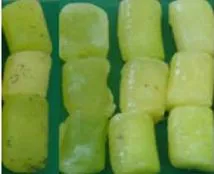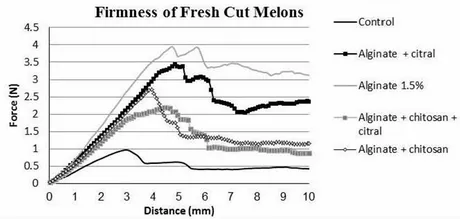The scientists of Volcani Centre (Israel), partners in the EU Quafety Project on quality and safety of fresh-cut produce, have studied the effects of two polysaccharides (alginate and chitosan) as components of edible coatings on the quality of fresh-cut melon Galia.
Alginate was used as a primary coating component, different alginate concentrations were tested (0.5% w/v, 1.5% w/v, 3% w/v, 6% w/v) on coating thickness and physiological properties of fresh-cut melon. The coating with 1.5% w/v of alginate gave the best results.
 On side: Microbial spoilage of fresh-cut melons after 20 days of storage at 6°C (from left: control, chitosan coating, alginate coating and alginate-chitosan coating).
On side: Microbial spoilage of fresh-cut melons after 20 days of storage at 6°C (from left: control, chitosan coating, alginate coating and alginate-chitosan coating).Afterwards, the scientists modified the alginate-based coating for providing an antimicrobial protection to the fresh-cut melon.
In the first case, the scientists added Citral (0.5%), an antimicrobial additive, to the alginate solution, but there were not significant antimicrobial effects.
In the second case, the scientists added chitosan, an antimicrobial polysaccharide, as component of the coating matrix. The addition of chitosan to the alginate matrix resulted in a significant microbial reduction (about 2 log units) as compared with the control and pure alginate coating.

Firmness of fresh-cut melons with alginate and alginate-chitosan coating with and without citral after 21 days of storage at 6°C.
The scientists conclude that:
- alginate-chitosan based edible coating allows to preserve quality and safety of fresh-cut melon Galia, thanks to the adhesive properties of alginate and the antimicrobial activity of chitosan;
- the use of antimicrobial essential oils needs further studies, because oil application at low concentrations is ineffective, while oil application at high concentrations has a negative impact on organoleptic characteristics of fresh-cut product.
